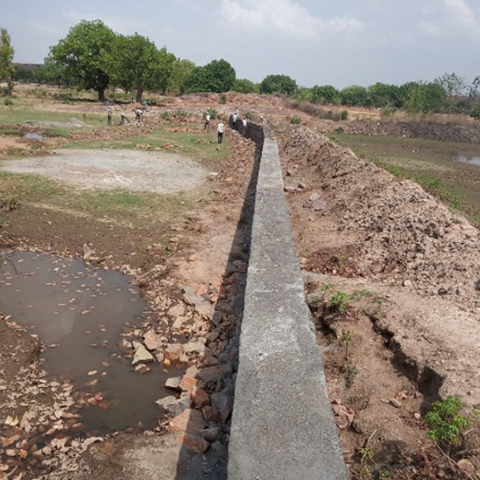Contact
Jennie Barron
Professor at the Department of Soil and Environment
jennie.barron@slu.se

In a recently published study performed in a semi-arid region in central India, researchers analysed how rainfed agriculture can be intensified with marginal impact on the landscape water balance. The results show, amongst other, that crop productivity increased by 10–70 % and income of rural households by 170%. The research and practitioner innovations was a critical factor to re-design traditional agricultural water management for new weather features.
Rainfall variability and water scarcity continue to hamper the food and income security of smallholder farming systems in poverty-affected regions. Innovations in soil and water management, especially in the drylands, are critical for meeting food security and water productivity targets of Agenda 2030. The study Building climate resilience in degraded agricultural landscapes through water management: A case study of Bundelkhand region, Central India analyses how rainfed agriculture can be intensified with marginal impact on the landscape water balance.
Jennie Barron, Professor at the Department of Soil and Environment; Agricultural water management, is one of the authors:
- Rainwater management is a tradition across the drylands of the world. But in recent changes in seasons and rainfall events, they may not be as productive as in the past. In this unique study in semi-arid Jhansi district of Bundelkhand region in central India, we worked in close collaboration with local community to re-design and innovate rainwater harvesting structures to be more sturdy to todays rainfall events and seasonality.
The team was also able to monitor landscape impacts for a 5 year period, to inform on sustainability and impact of these changes in water availability and crop intensification due to improved surface water storage (haveli* system), check dams, and field infiltration structures.
Rainwater harvesting structures did alter the landscape’s hydrology, limiting average surface runoff from 250 mm/year to 150 mm/year over the study period. Groundwater levels increased by 2–5 m, alleviating water scarcity issues of the communities in recurring dry years. Nearly 20% of fallow lands were brought under cultivation. Crop yields increased by 10–70% and average household income increased from US$ 960/year to US$ 2700/year compared to that in the non-intervention landscape. The combined soil–water–vegetation efforts strengthened water resilience and environmental systems in agricultural landscape.
The study was led by ICRISAT (International Crops Research Institute for the Semi-Arid Tropics ) with partners.
*A 200-300-year-old Indian rainwater harvesting system acting as a reservoir during monsoon and as a fertile farm in the next season.
Kaushal K. Garg, Ramesh Singh, K.H. Anantha, Anand K. Singh, Venkata Radh Akuraju, Jennie Barron, Inder Dev, R.K. Tewari, Suhas P. Wani, S.K. Dhyani, Sreenat Dixita (Journal of Hydrology Volume 591, December 2020, 125592)
Scaling-up Agriculture Water Management Interventions for Building System Resilience in Bundelkhand Region of Central India
Kaushal K. Garg, Anantha K.H., Jennie Barron, Ramesh Singh, Inder Dev, Sreenath Dixit, Anthony M Whitbread (forthcoming 2021, FAO FAO Agricultural Development Economics Technical Studies)
Jennie Barron
Professor at the Department of Soil and Environment
jennie.barron@slu.se